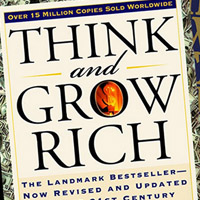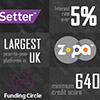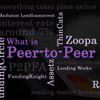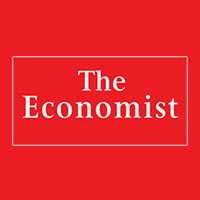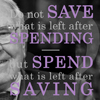The 5 greatest personal development books to guide you to success
A good book can improve your mood. A great book can improve your life.
The shelves of your local bookshop are overflowing with self-help books. But which are the ones that will really reveal how to be smarter with your money, wiser and more confident with your decision making and best help you reach your goals?
Here are the five best books I believe will help set you on your way to success. Each of these contain more than just theories and fancy talk. These titles show you the practical steps you need to take to navigate that road to where you want to be.
Think and Grow Rich by Napoleon Hill
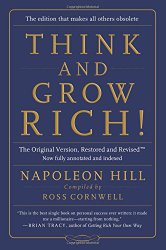 If you only read one book from this list, make it this one.
If you only read one book from this list, make it this one.
Of all the books I’ve ever read, Hill’s one has had the most profound effect on me. Which is why it sits top of my list.
First published in 1937, ‘Think and Grow Rich’ was the culmination of twenty years of interviews by Hill with some of the most successful men of his generation. The words of giants such as Andrew Carnegie, Thomas Edison, Henry Ford, John D. Rockefeller, J. Pierpont Morgan Sr. and Theodore Roosevelt are just some of the words that echo through these pages.
The answers Hill gets from his subjects and the insight he provides sheds a fascinating light on the way successful people think and act. This is a must read for anyone who wants to take a shot at investing in themselves to be the best they can possibly be in business or finance.
Rich Dad Poor Dad by Robert T. Kiyosaki
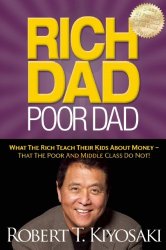 If you want to change your spending habits and escape from the rat race this book will show you the right way to go about it.
If you want to change your spending habits and escape from the rat race this book will show you the right way to go about it.
Rich Dad Poor Dad is smartly written book and a joy to read. It appeals to those without a wealth of financial knowledge whilst also having plenty for those who already consider themselves money savvy.
Taking inspiration from his own childhood and family upbringing, Kiyosaki uses examples of the different attitudes and philosophies of two men, his two dads (‘rich dad’ and ‘poor dad’) to illustrate different ways of thinking about and using money. Kiyosaki looks at how rich people put money into assets (which grow in value or generate income e.g. shares, real-estate etc.), while ‘average’ people put money into liabilities (things that lose values such as cars or clothes).
At present too many people have the bad habit of spending their money on liabilities, rather than assets. For large parts of society, it has become more important to spend their money on goods that bring short-term satisfaction and instant peer recognition, rather than long-term rewards. In the worst case scenario, these habits means people even get themselves in debt just to own what are effectively ‘worthless’ goods.
A primary focus in this book is that we have to learn financial literacy ourselves and to be able recognise between assets and liabilities and incorporate this into our daily lives. If these habits form part of our lives then it becomes much easier to pass it on to our children and other people. The most important step though is that we need to start doing this ourselves.
Spending too much money on liabilities is a behaviour I’ve never quite understood and something more people should be aware of. Please, read this book before you buy your next iPhone on your new credit card. It could really make a difference to how you use your finances.
The Richest Man in Babylon by George S. Clason
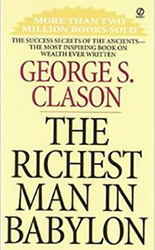 "Like the law of gravity, they are universal and unchanging. May they prove to you, as they have proven to so many others, a sure key to a fat purse, larger bank balances and gratifying financial progress."
"Like the law of gravity, they are universal and unchanging. May they prove to you, as they have proven to so many others, a sure key to a fat purse, larger bank balances and gratifying financial progress."
With these words begins Clason’s 1926 book about financial principles, which presents the case that the best financial advice from 6000 years ago still applies today. The only difference is where there was once gold we now have credit cards.
The book is a collection of pamphlets originally published by banks and insurance companies to provide financial tips for those looking to be smarter with their money.
Clason puts forth the case, via ancient parables, that money is plentiful for those who understand the simple rules of its acquisition.
The book’s key commandments are:
- 1. Start thy purse to fattening
- 2. Control thy expenditures
- 3. Make thy gold multiply
- 4. Guard thy treasures from loss
- 5. Make of thy dwelling a profitable investment
- 6. Insure a future income
- 7. Increase thy ability to earn
Clason teaches people to be self-reliant and that even if their present financial situation seems hopeless, there is a way to improve things.
A timeless classic, this book is a breeze to read but full of great nuggets of wisdom that are perfect teach your children to learn about money. I'm already looking forward to reading this story with my little daughter before I put her to sleep.
How to Win Friends & Influence People by Dale Carnegie
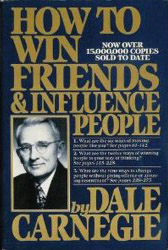 Although Dale Carnegie started out as a salesman, he became one of the most influential lecturers of all time. Born into poverty, he built his fame through his innovative courses and lectures about successful communication skills for adults. His ideas were lapped up by big corporations and he became a hugely sought after consultant.
Although Dale Carnegie started out as a salesman, he became one of the most influential lecturers of all time. Born into poverty, he built his fame through his innovative courses and lectures about successful communication skills for adults. His ideas were lapped up by big corporations and he became a hugely sought after consultant.
He wrote many many international bestsellers on personal development with How to Win Friends and Influence People the most famous of them. Since publication in 1936 it has sold over 30 million copies and is both one of the first and most popular personal development books ever published.
The book is highly recommended for anyone who wishes to refine the way they cooperate or communicate with others. It is a great book about interpersonal relationships and will help you understand why people take criticism personally and how to give feedback that doesn’t offend. It provides very useful tips on keeping people motivated and, most importantly, how to listen to people and sell successfully.
Style wise, Dale’s charming manner and ability to tell a story makes it an easy read and he avoids dull lists of do’s and don’ts.
The book is divided into four main parts:
- 1. Basic principles in dealing with people
- 2. Six ways to be liked
- 3. How to win friends
- 4. How to be a natural leader
If I were asked to sum up in one quote the essence of this book it’s here: “If we want others to respect and listen to us, we need first to start to respect and listen to them. In contrary by alienating others or acting disrespectful has never helped anyone to win new friends."
Who Moved My Cheese by Dr. Spencer Johnson
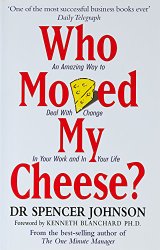 If ever a book proved it didn’t need to be long to have an impact it’s this one. Readable in just a few hours, the lessons in this book will stick in your mind forever and could well change your approach to life.
If ever a book proved it didn’t need to be long to have an impact it’s this one. Readable in just a few hours, the lessons in this book will stick in your mind forever and could well change your approach to life.
Johnson’s Who Moved My Cheese? takes a different approach to the traditional self-help book. Taking the form of an allegorical tale of mice looking for cheese in a maze, the book doesn’t offer direct examples of how to go about running your careers or handling your finances.
Instead, it helps you reframe how you think about overcoming challenges in life and how you approach your goals. Through its deceptively simple storytelling device, the book can help you overcome the fears and lack of confidence most of us have and will push you to step up to the next level and guide you to your dreams and goals.
It’s key theme is getting people to consider what they would do if they ‘were not afraid’.
Cheese may seem an odd metaphor for what makes us happy and motivates us, but Johnson pulls it off. By the end of the book you’ll be ready to take a fresh approach to relationships, your career and your finances.
Conclusion
Hopefully this list has inspired you to delve into some of these wonderful books and get motivated. I strongly recommend reading them all and if you choose to do so I can say it really doesn’t matter what order you tackle them.
The key thing is to be open to their messages and themes and, most importantly, implement the teachings you encounter as best as you can. If you do that, you should be able to find that tasty piece of cheese you’ve always wanted.

